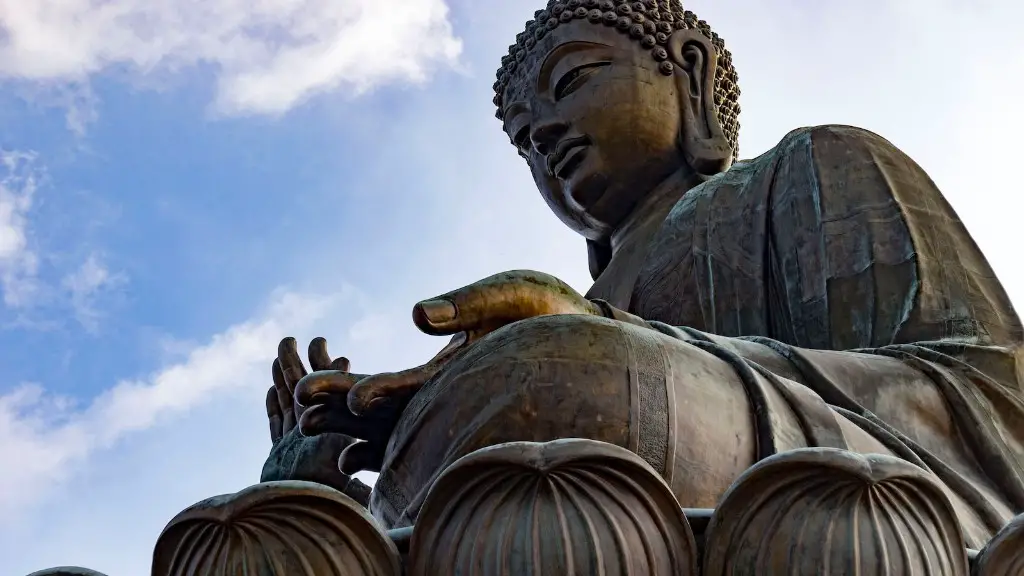Buddhism and Christianity are two of the most popular religions in the world. Despite their many differences, there are also several similarities between the two faiths. For example, both religions teach about the importance of love and compassion. They also both believe in the importance of helping those in need.
Buddhism and Christianity both advocate for compassion, love, and forgiveness. They also both believe in a higher power and the importance of living a moral life. Buddhism and Christianity also share similar views on the nature of the soul and the afterlife.
How are Buddhism and Christianity similar and different?
There are inherent and fundamental differences between Buddhism and Christianity, one significant element being that while Christianity is at its core monotheistic and relies on a God as a Creator, Buddhism is generally non-theistic and rejects the notion of a Creator God which provides divine values for the world.
Buddhism instead relies on the Four Noble Truths and the Eightfold Path as the means to achieve enlightenment and nirvana, respectively. Christianity, on the other hand, relies on faith in God and following His commands as set forth in the Bible in order to gain salvation.
Ultimately, Buddhism and Christianity offer different paths to salvation or enlightenment, with Christianity being focused on a personal relationship with God and Buddhism being more focused on self-improvement and inner peace.
Buddhism is one of the oldest religions in the world and Christianity is one of the newest. As such, it is not surprising that there is no historical evidence of any influence by Buddhism on Christianity. Paula Fredriksen, a leading scholar on the origins of Christianity, states that no serious scholarly work has placed the origins of Christianity outside the backdrop of 1st century Palestinian Judaism. This is not to say that Buddhism has never had any influence on Christianity – there have been individual Christians who have been influenced by Buddhism – but as far as the origins of Christianity go, it is clear that Buddhism played no role.
What are the similarities between the Buddha and Jesus
The Buddha’s and Jesus’ religious quests both led them to important spiritual experiences and insights. For the Buddha, this occurred under the Bo tree after six years of religious searching. For Jesus, his quest led him to the wilderness and to his spiritual mentor, John the Baptist. Both of these figures began renewal movements within their respective religious traditions of Hinduism and Judaism. In this way, they each helped to bring about new understanding and ways of practicing their faith.
Both Buddhism and Hinduism share the goal of liberation or spiritual enlightenment from the cycle of rebirths (samsara). However, the two traditions differ in their understanding of the nature of the self and the path to liberation. For Buddhism, the self is an illusion that must be abandoned in order to achieve liberation. In contrast, Hinduism teaches that the self is a divine spark that must be realized in order to achieve liberation. The two traditions also differ in their understanding of the nature of reality. Buddhism teaches that reality is an illusion (maya), while Hinduism teaches that reality is ultimately Brahman, the absolute reality that underlies and pervades all of creation.
What is the contrast of Christianity and Buddhism?
Buddhism is a nontheistic religion or philosophy, which means it does not believe in a supreme creator being, often referred to as “God.” Christianity, on the other hand, is a monotheistic religion that believes in one supreme being – namely, that Christ is the Son of God.
Buddhism and Christianity have a lot in common. They both started out as an effort to reform the religions from which they had come, but soon emerged as separate religions. Both religions teach about love, compassion, and forgiveness, and both have a strong ethical code. However, there are also some significant differences between the two religions. Buddhism teaches that there is no soul, while Christianity teaches that there is. Buddhism teaches that there is no afterlife, while Christianity teaches that there is. Christianity also teaches that Jesus is the only way to salvation, while Buddhism does not.
Do Buddhists believe in God?
Siddhartha Gautama was the first person to reach the state of enlightenment. He is known as the Buddha. Buddhists do not believe in any kind of deity or god, although there are supernatural figures who can help or hinder people on the path towards enlightenment.
The central iconic imagery of Buddhism and Christianity underscore the difference in their belief structures. In Buddhism, the peaceful death of Gautama Buddha at an old age is contrasted with the harsh image of the crucifixion of Jesus as a willing sacrifice for the atonement for the sins of humanity. This difference in beliefs is reflected in the different ways that each tradition approaches death and the afterlife.
Which of the following is true of both the Buddha and Jesus
There are a few key ways in which the Buddha’s teachings differed from those of Hindu thought at the time. One was the Buddha’s emphasis on personal experience and on individuals reaching enlightenment through their own efforts, rather than relying on Brahmanic priests or the authority of the Vedas. Additionally, the Buddha taught that there was no permanent soul or self, and that suffering could be ended through detachment from desires. This was in contrast to Hindu beliefs that stipulated the existence of a soul and reincarnation.
Both Christianity and Islam are Abrahamic religions, meaning that they began with the worship of the God of Abraham. Both religions also have their origins in the two sons of Abraham, making them even more closely related. There are many similarities between Christianity and Islam, making them both important religions in the world today.
Do Buddhists believe in heaven?
In Buddhism, there is no concept of punishment or reward and there is no divine being who decides who goes to hell or heaven. There is merely the illusory results of our thought, words and deeds, which we call karma.
Buddhism is a religion that is based on the teachings of Siddhartha Gautama. The main principles of this belief system are karma, rebirth, and impermanence.
How was the spread of Christianity similar to the spread of Buddhism
Both Christianity and Islam are similar in that they are both open to conversion from other religions. Additionally, both religions were spread by their respective founders’ disciples after their deaths, and both have spread through peaceful contact and trade.
The spread of both Buddhism and Christianity can be explained by the fact that they were both religions of monks. The monks community offered protection from the strife that surrounded them. This helped to spread the religions to new areas.
What similarities does Buddhism have with other religions?
There are many common features between Buddhism and other world religions on ethical and moral issues, such as the prohibition of killing other human beings, stealing, etc. and on the positive side the practice of generosity, compassion, etc. However, morality is only the preliminary stage in Buddhism and is a means to an end. The ultimate goal is to attain Nirvana, which is liberation from the cycle of rebirth.
The Buddhist teachings on devas and other deities are based on the belief in saṃsāra, or the cycle of rebirth. According to this doctrine, there are divine beings called devas (sometimes translated as ‘gods’) who inhabit different levels of heaven. In addition, there are also other Buddhist deities, such as the Buddha himself, who also inhabit different levels of heaven.
Do Buddhists believe in afterlife
Buddhist teaching views life and death as a continuum, believing that consciousness (the spirit) continues after death and may be reborn Death can be an opportunity for liberation from the cycle of life, death and rebirth.
Despite what many people believe, many Buddhists do celebrate the holiday season. In fact, among Asian American Buddhists, three-quarters say they celebrate Christmas. Additionally, on December 8th, some Buddhists also observe Bodhi Day, which marks when the Buddha reached enlightenment. So, while the Christmas season may be celebrated differently by Buddhists than by people of other religions, it is still a time of joy and celebration for many Buddhists.
Conclusion
Buddhism and Christianity are both Abrahamic religions that originated in the Middle East. Both religions teach the concept of monotheism, or the belief in one God. Both religions also place an emphasis on compassion, love, and forgiveness. Additionally, both Buddhism and Christianity have significant global followings, with each religion having billions of adherents around the world.
Though they have many differences, Buddhism and Christianity have a number of shared beliefs and practices. Both religions place an importance on compassion and helping those in need, and teach that all beings are connected. They also both emphasize the importance of meditation and prayer, and have similar views on the afterlife. Though they have different origins and beliefs, Buddhism and Christianity can come together on common ground.



